

Declining eyesight improved by looking at deep red light. Staring at a deep red light for three minutes a day can significantly improve declining eyesight, finds a new UCL-led study, the first of its kind in humans.
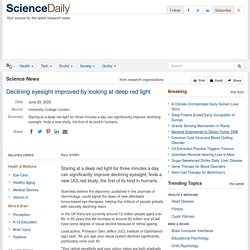
Scientists believe the discovery, published in the Journals of Gerontology, could signal the dawn of new affordable home-based eye therapies, helping the millions of people globally with naturally declining vision. In the UK there are currently around 12 million people aged over 65: in 50 years this will increase to around 20 million and all will have some degree of visual decline because of retinal ageing. Lead author, Professor Glen Jeffery (UCL Institute of Ophthalmology) said: "As you age your visual system declines significantly, particularly once over 40.
"Your retinal sensitivity and your colour vision are both gradually undermined, and with an ageing population, this is an increasingly important issue. "To try to stem or reverse this decline, we sought to reboot the retina's ageing cells with short bursts of longwave light. " Superior Tactile Abilities in the Blind: Is Blindness Required? Patrice Voss +Show Affiliations The Journal of Neuroscience, 17 August 2011, 31(33): 11745-11747; doi: 10.1523/JNEUROSCI.2624-11.2011 How blindness affects a person's other senses has been questioned for some time.
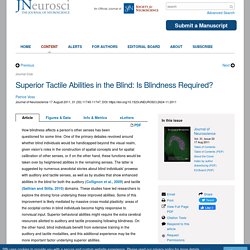
One of the primary debates revolved around whether blind individuals would be handicapped beyond the visual realm, given vision's roles in the construction of spatial concepts and for spatial calibration of other senses, or if on the other hand, these functions would be taken over by heightened abilities in the remaining senses. The latter is suggested by numerous anecdotal stories about blind individuals' prowess with auditory and tactile senses, as well as by studies that show enhanced abilities in the blind for both the auditory (Collignon et al., 2009) and tactile (Sathian and Stilla, 2010) domains. The findings of Wong et al. (2011), along with those of previous research, raise interesting and important questions.
Figure 1. Footnotes Received May 26, 2011. Loss of Sight and Enhanced Hearing: A Neural Picture. Do Blind People Have a More Acute Sense of Smell? New research refutes the age-old myth that the loss of one sense may sharpen other senses.
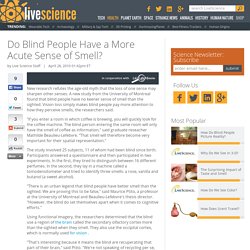
A new study from the University of Montreal found that blind people have no keener sense of smell than the sighted. Vision loss simply makes blind people pay more attention to how they perceive smells, the researchers said. "If you enter a room in which coffee is brewing, you will quickly look for the coffee machine. The blind person entering the same room will only have the smell of coffee as information," said graduate reseacher Mathilde Beaulieu-Lefebvre. "That smell will therefore become very important for their spatial representation. " The study involved 25 subjects, 11 of whom had been blind since birth. 'Blindness’ may rapidly enhance other senses. Can blindness or other forms of visual deprivation really enhance our other senses such as hearing or touch?
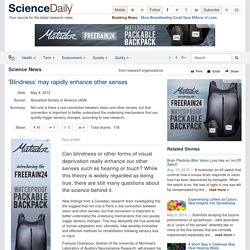
While this theory is widely regarded as being true, there are still many questions about the science behind it. New findings from a Canadian research team investigating this link suggest that not only is there a real connection between vision and other senses, but that connection is important to better understand the underlying mechanisms that can quickly trigger sensory changes. This may demystify the true potential of human adaptation and, ultimately, help develop innovative and effective methods for rehabilitation following sensory loss or injury. Studies have shown, in terms of hearing, that blind people are better at localizing sound.
One study even suggested that blindness might improve the ability to differentiate between sound frequencies. "When we speak or play a musical instrument, the sounds have specific harmonic relations. Super Powers for the Blind and Deaf. It's an oft-repeated idea that blind people can compensate for their lack of sight with enhanced hearing or other abilities.
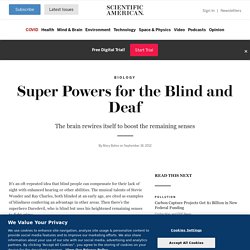
The musical talents of Stevie Wonder and Ray Charles, both blinded at an early age, are cited as examples of blindness conferring an advantage in other areas. Then there's the superhero Daredevil, who is blind but uses his heightened remaining senses to fight crime. It is commonly assumed that the improvement in the remaining senses is a result of learned behavior; in the absence of vision, blind people pay attention to auditory cues and learn how to use them more efficiently.
But there is mounting evidence that people missing one sense don't just learn to use the others better. The brain adapts to the loss by giving itself a makeover.